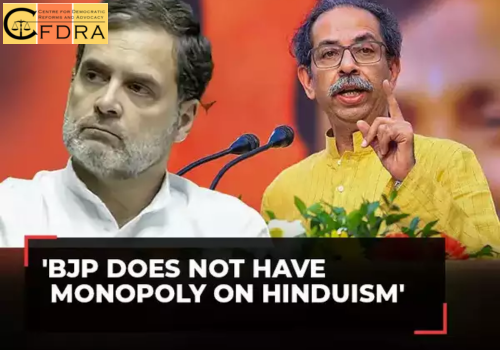Uddhav Thackeray vigorously defended Rahul Gandhi against allegations of insulting Hinduism, asserting that BJP does not hold a monopoly on Hindu ideology. Thackeray, in a staunch rebuttal, questioned critics, asking, “Where did he insult Hinduism?” He emphasized that Rahul Gandhi’s remarks did not denigrate the essence of Hinduism or Hindutva, but rather challenged the BJP’s exclusive claim to representing Hindu interests. Thackeray’s impassioned defense underscored a broader debate over the interpretation of Hindu identity and the political narratives surrounding it in contemporary Indian discourse.
The Controversy Unfolds
The controversy ignited following Rahul Gandhi’s debut speech as the Leader of Opposition in the Lok Sabha, where he launched a scathing critique of the BJP’s policies, accusing its leaders of fostering communal divisions in the country. Gandhi’s remarks, which aimed to challenge the BJP’s hegemony on Hindu identity politics, sparked a heated debate both within and outside Parliament.
Uddhav Thackeray’s Defense
In response to criticisms leveled against Gandhi, Uddhav Thackeray came out strongly in his defense. He posed a poignant question to critics and opponents alike: “Where did he insult Hinduism?” Thackeray emphatically rejected the notion that Gandhi’s remarks undermined Hindu values or Hindutva principles. Instead, he argued that Gandhi’s speech sought to differentiate between the broader Hindu ethos and the narrow political interpretations propagated by the BJP.
BJP’s Monopoly on Hinduism
Central to Thackeray’s defense was his assertion that the BJP does not have a monopoly on Hinduism. He challenged the BJP’s narrative that equates its political ideology with the broader principles of Hinduism and Hindutva. Thackeray emphasized that Hinduism is a diverse and inclusive religion, encompassing a wide spectrum of beliefs and practices that cannot be confined to any single political entity’s interpretations.
Hindutva Beyond Politics
Thackeray reiterated that the concept of Hindutva goes beyond partisan politics. He emphasized its spiritual and cultural dimensions, which, according to him, are often overshadowed by political agendas. By defending Gandhi’s stance, Thackeray sought to reclaim the narrative of Hindutva from the narrow confines of electoral strategies and political rhetoric, urging a more holistic understanding that respects the diversity within Hindu traditions.
The Role of Rahul Gandhi
Rahul Gandhi’s role in this debate has been pivotal. As the scion of the Nehru-Gandhi dynasty and a prominent figure in the Indian opposition, Gandhi’s remarks signaled a strategic shift in the Congress party’s approach towards countering the BJP’s dominance in Hindu nationalist discourse. His assertion that the BJP does not represent the entirety of Hindu thought has resonated with many who believe in a more inclusive and pluralistic interpretation of Hinduism.
Political Implications
The political implications of this debate are profound. As India prepares for upcoming state elections and looks towards the next general elections, the contest over Hindu identity and Hindutva will likely intensify. Thackeray’s defense of Gandhi reflects broader efforts within the opposition to challenge the BJP’s hegemony on issues of religion and nationalism, aiming to redefine the political landscape in a more inclusive manner.
Challenges Ahead
However, challenges lie ahead for both Thackeray and Gandhi. The BJP, with its extensive organizational reach and ideological cohesion, continues to wield significant influence over public discourse on Hinduism and nationalism. Critics of Gandhi argue that his remarks could alienate sections of the electorate who identify strongly with the BJP’s vision of Hindutva, posing electoral risks for the opposition.
Conclusion
In conclusion, Uddhav Thackeray’s staunch defense of Rahul Gandhi against accusations of insulting Hinduism highlights a broader ideological struggle within Indian politics. The debate over BJP’s claim on Hinduism is not merely a rhetorical clash but a fundamental contestation over the meaning and interpretation of India’s cultural and religious identity. As the political landscape evolves, the positions articulated by Thackeray and Gandhi will continue to shape the discourse on Hinduism, nationalism, and electoral strategies in the country.

